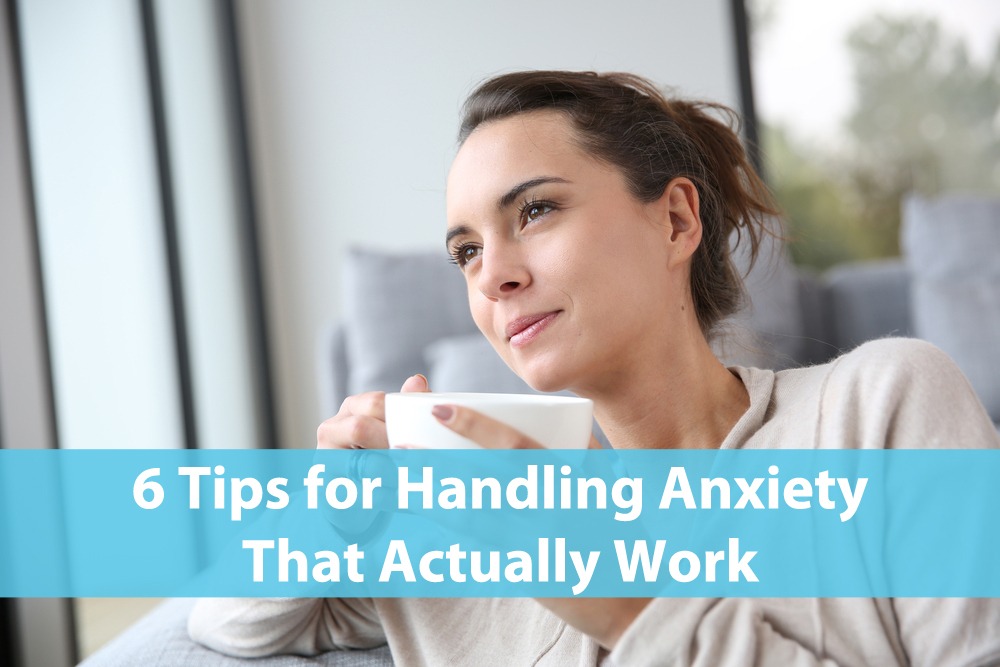
6 Tips for Handling Anxiety That Actually Work

Anxiety is a condition that affects many women in various ways. It’s brought on by stress and increased by fear and major life changes. It leaves you spending each day constantly worrying “what if” about every situation that comes along. Left untreated anxiety can consume your whole world. If your anxiety is debilitating seek professional help from a therapist. Otherwise, there are some things you can do on your own to help. Try these strategies below to fight anxiety and get your life back!
1. Designate a time to worry
Worrying or being concerned is a natural part of life. These feelings can push you to act on situations you may never have otherwise bothered addressing. But anxiety is worry on overload. To help you manage your feelings you can create a designated time frame to assess the issues that worry you. When the session is over make a mental note to come back to it later. Doing so alleviates the urge to continuously address the topics in your mind. As you continue to practice, you’ll soon realize that you can let go of your anxiety for periods of time and start to enjoy other aspects of your life!
2. Rationalize the problem at hand
Problems are going to happen no matter how much time you put into making things perfect. What you do when situations arise makes all the difference. You can either waste time worrying or spend time finding a resolution. The next time you are presented with an obstacle determine whether there is a clear solution. If there is a solution begin acting on it as soon as possible rather than leaving the job for later. Putting things off only allows you to dwell on the circumstances longer. If the problem is not easily solved or unsolvable then admit this to yourself. Do what you can and let go of the rest. Learn to accept that you can not control everything.
3. Simply Breathe
When worrying becomes too much remember to breathe, both literally and figuratively! Take a break from your every day routine to relax and have fun. Find something to laugh about. There are many studies linking laughter to improved mental health. Take some time to step away from what you are doing and put your feet up or get fresh air. These breaks can relieve some of the pressure and potential damage that can come from the constant stress of anxiety. This also serves as a good way to reconnect with yourself and get in touch with your true desires.
4. Make time to exercise and clear your mind
Try exercising more. It’s not only beneficial to your body, it’s great for your mind. Exercise fights anxiety by burning stress hormones and it simultaneously increases the production of calming agents in the body. Likewise exercise keeps you busy and helps keep your mind off your worries. Plus if you go to a gym you have the opportunity to socialize and meet new or interesting people.
5. Take control of your diet
Take control of what you put in your body. Some drinks such as coffee can actually stimulate stress hormones. Likewise, consuming drinks high in sugar and large quantities of carbohydrates can result in blood sugar crashes and trigger anxiety. So be sure to maintain a healthy diet in order to keep an ideal chemical balance. You might also want to look at herbs and supplements to help regulate stress related challenges.
6. Avoid destructive behavior
Some people gravitate towards risky behaviors and reckless lifestyles in order to cope with the stresses of life. Overindulging in alcohol or using drugs, “partying”, unsafe sex, and other behaviors might help you lose yourself in a world where you feel like you have abandoned your worries. But your problems and realities do not disappear, they merely wait for you. It’s much better to utilize positive coping strategies and give yourself a chance to live a healed, healthy life.
Remember, the true success of any strategy lies in your willingness to commit. Only you can take the steps necessary to move towards an anxiety free life. For more expert advice about anxiety and other issues related to it, please feel free to ask Laurie a question any time.





